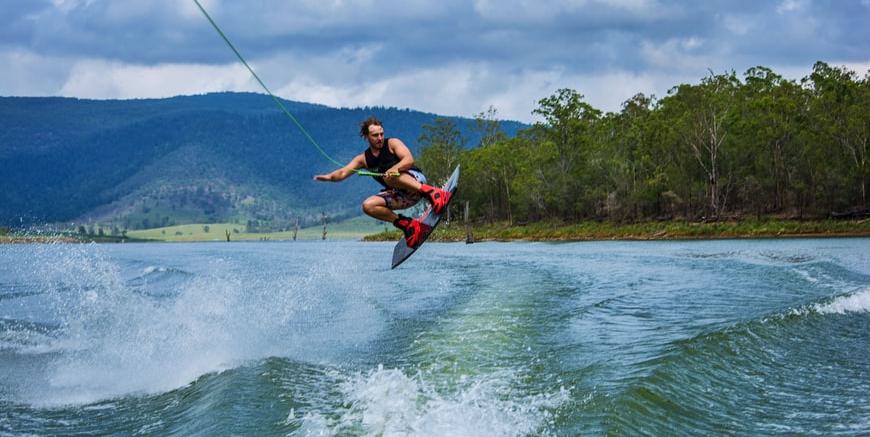Perhaps a fitting end to the 2022 Alabama Regular Legislative Session was a somewhat humorous discussion of wake boarding that went nowhere.
A controversial bill to improve water safety in Alabama failed in the closing moments of the Session as both Houses passed differing versions of the bill, but both bodies elected to end the session just before midnight rather than come back for the 30th legislative day. Thirty days is the maximum that the 1901 Constitution allows the Legislature to meet.
Senate Bill 281 (SB281) was sponsored by State Sen. Garlan Gudger (R-Cullman) and carried in the House by State Rep. Ginny Shaver (R-Centre).
Wakeboarding is a water sport that began in the 1980s in Australia and Florida that is loosely based on both water skiing and snowboarding. In wakeboarding, the rider is fastened to a board and towed behind a motorboat at speeds of around 30 miles per hour. The rider can ride the surface of the water, as well as perform wakeboarding tricks behind the boat.
The Gudger bill attempted to make the sport safer by prohibiting it within 200 feet of a shoreline and banning it altogether in portions of lakes, bays, lagoons, and rivers less than 400 feet wide or in any lake of less than 50 acres.
The measure easily passed the Alabama Senate but ran into a firestorm of opposition in the Alabama House of Representatives.
But then it got into a back-and-forth between legislators and their personal preferences.
State Rep. Barbara Drummond (D-Mobile) demanded that the Dog River, on the Mobile Bay, be excluded from the bill.
Shaver agreed to an amendment that excludes rivers.
State Rep. Margie Wilcox (D-Mobile) said, “We want to make sure that South Alabama is kept out of it.”
Shaver agreed to limit it to “only lakes created by a dam”.
The committee amendment was adopted 87-2.
State Rep. David Faulkner (R-Mountain Brook) brought his own floor amendment
“We compromised on reducing the amount of body of water that you can wake surf in,” Faulkner said. “Mobile Bay is already out of this.”
State Rep. Danny Garrett (R-Trussville) said, “Tell me exactly what this does.”
“It takes out the word misdemeanor and turns it into a violation,” Faulkner said.
“This is what I would do on the weekend,” State Rep. Paul Lee (R-Dothan) said. “If you are going to fine people for the distance from shore then it needs to be clearly marked. I am bringing my own amendment.”
Rep. Tommy Hanes (R-Scottsboro) said, “Rep. Lee is 110% correct. Distance on the water will fool you. If you leave it up to the enforcing officer, there will be a lot of disagreements on this. They don’t have enough buoy markers."
Faulkner said, “It reduces the distance from 200 feet to 150 feet.”
Hanes said, “Nobody can look at it accurately with the naked eye. I have been a 'no' on this. I want to take the Tennessee River out of it. I will still be a 'no.'”
State Rep. Tim Wadsworth (R-Arley) said, “You cannot wakeboard within 150 feet of a manmade structure. Bridges are a manmade structure. We have got like 8 bridges on Smith Lake.”
“I took bridges out of the amendment,” Faulkner said.
Wadsworth wanted more buoys.
“My amendment does not have anything to do with buoys,” Faulkner said.
“There is no way that ALEA can put buoys along every mile of shoreline in the state,” Shaver said.
Faulkner explained that there would be no limit on distance to uninhabited shoreline and would decrease the distance to shore to 150 feet, and ban wakeboarding in waters less than 300 feet (down from 400 feet in the original bill).
Faulkner’s amendment was adopted 85-0.
State Rep. Mike Jones (R-Andalusia) brought an amendment stating, “This bill would impact only Smith Lake.”
Wadsworth said, “You are not from Winston or Walker County. The sponsor is not from Winston County. Why does this apply to only Winston County? This is not desired by everybody in Winston County.”
Jones said, “The people in my area are not interested in being under this bill.”
Wadsworth said, “The bill needs to die.”
The Jones amendment was adopted.
Lee brought his buoy amendment saying that this limit on distance can be enforced “only where buoys are in place".
“I have been told that ALEA cannot put buoys by every dock in the state,” Shaver said.
“If they can’t, then they can’t enforce this,” Lee said.
“I have been involved in hiring law enforcement officers and you can’t tell when you hire them which of them are going to be Andy Griffith and which will be Barney Fifes,” Lee said. “I don’t know who is going to be writing this ticket, Andy Griffith or Barney Fife.”
“None of the legislators in this body want this on their lake,” Wadsworth said.
State Rep. Proncey Robertson (R-Decatur) said, “My whole channel would be surrounded with buoys.”
“Then vote the bill down,” Lee said. “If I am going to get a ticket, I want to know what I am being ticketed for.”
The Lee amendment was adopted 44-5.
The bill passed as amended 37-33.
The bill went back to the Senate with time running out on the legislative day.
When it got back to the Senate the time was after 11:30 pm. Gudger motioned that the Senate non concur with House changes and send the legislation to conference committee. By that time the House was honoring retiring members of the House and the clerks were rushing to finish business. The Senate would end the session before the Senate message to form a conference committee got back to the House of Representatives.
The 2022 Alabama Regular Legislative Session is over and SB281 is dead, so wakeboarders in Alabama can go on as before.
And legislators can go back to their respective lakes in peace.










